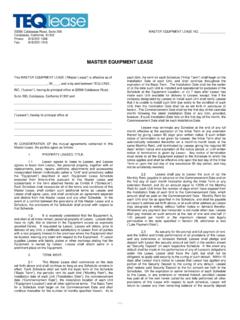Transcription of Tobacco Settlement Fund 2017/18 - pahouse.com
1 January 12, 2018. November 3, 2016. Tobacco Settlement fund 2017 /18. The 2017 /18 budget spends $ million from the Tobacco Settlement fund on health-related programs. As in previous years, the General Assembly amended the Fiscal Code's funding provisions to redirect Tobacco revenue to help fund Medical Assistance long-term care in the Department of Human Services. As part of the Republican plan to balance the 2017 /18 state budget, the General Assembly amended the Tax Reform Code (Act 43 of 2017 ) to allow for the monetization of a portion of Tobacco payments due the commonwealth. Monetization will reduce the amount of Tobacco funds available to pay for health-related programs in future budgets. Background The Tobacco Settlement fund is a special fund for the deposit of payments received by Pennsylvania under the 1998.
2 Master Settlement Agreement between the major Tobacco companies and 46 states. The agreement settled claims filed against the Tobacco industry to recover Medicaid costs associated with treating smoking-related illnesses. In exchange for the states dropping their lawsuits, the Tobacco companies agreed to make annual payments in perpetuity to the settling states. Act 77 of 2001 (the Tobacco Settlement Act) created the Tobacco Settlement fund and also established several health- related programs which are supported by the fund . Each year, annual Tobacco payments are distributed to programs based on percentages set forth in state law. The table below shows the allocation percentages established in the Fiscal Code under Act 71 of 2013.
3 These percentages replaced permanently the allocation percentages that were initially part of the Tobacco Settlement Act. The funding provisions in Act 71 allocate most of the annual Tobacco payments ( percent) to specific programs and retain the rest of the payments in the Tobacco Settlement fund to be appropriated by the General Assembly for other health-related purposes. Additionally, Act 71 requires all other payments and revenues received in the Tobacco Settlement fund to be appropriated for health-related purposes. Act 71-2013. Allocation Programs Funded with Annual Tobacco Payments Percentages Home & Community-Based Services 13%. Tobacco Use Prevention & Cessation Health Research - Health Priorities Health Research National Cancer Institute 1%.
4 Hospital Uncompensated Care Medical Assistance for Workers with Disabilities 30%. PACENET Transfer 8%. Health-Related Purposes Revenues and Funding Modifications The 2017 /18 budget spends $ million from the Tobacco Settlement fund , including: $ million from the annual payments Pennsylvania anticipates from Tobacco companies in April 2018, a $ million increase from 2017 ; and $ million from available balances in the Tobacco Settlement fund . Through amendments to the Fiscal Code (Act 44/House Bill 674), the General Assembly eliminated the 8 percent alloca- tion for PACENET and increased the allocation for health-related purposes from percent to percent. This change redirects $ million in 2017 /18 to help fund long-term care in the Department of Human Services.
5 The Act 44 funding formula is the same one the General Assembly adopted in the previous two budgets. In addition to the redirected dollars, the enacted budget appropriates lapsed (unspent) funds from the prior year for health-related purposes, increasing Tobacco funds for long-term care by another $ million. Act 43 of 2017 . Act 43 of 2017 authorizes the Commonwealth Finance Authority to explore the monetization of Tobacco payments due the commonwealth under the Master Settlement Agreement. This authorization allows for either the sale or securitization of MSA revenues, with the selection between the two approaches delegated to CFA. In December, the authority opted to pursue securitization after no bids were received for a direct sale of revenues.
6 This means that the commonwealth will borrow money to balance this year's budget by issuing bonds that will be secured with future Tobacco payments. CFA expects to price revenue bonds for the securitization in January and close the transaction in February 2018. The debt service on bonds issued through this securitization will only be payable from future MSA payments (the holders of the bonds will not have any claim to other commonwealth revenues and the full faith and credit of the commonwealth will not be pledged for repayment). The proposed securitization will raise up to $ billion in net proceeds and have a maximum term for repayment of 30. years. CFA is also permitted to capitalize the interest payments due on the bonds for a period of up to 2 years, which will reduce the early debt service payments while increasing the total debt service cost over the life of the bonds.
7 This will limit the immediate impact of reduced MSA revenues available for programmatic spending. Program Expenditures The table below details 2017 /18 Tobacco Settlement fund expenditures by program, beginning with those designated in Act 77 to receive ongoing support. Three programs rely exclusively on Tobacco funding for their support: health re- search, Tobacco use prevention and cessation, and hospital uncompensated care payments. The remaining programs are supported with other revenue sources, including the General fund , Lottery fund and federal funds. Expenditures for the two health-related programs long-term care and life sciences greenhouses are appropriated from the Tobacco Settlement fund as part of the General Appropriations Act.
8 All Act 77 program expenditures are made by executive authorizations according to the allocation percentages in the Fiscal Code. House Appropriations Committee (D) 717-783-1540 Tobacco Settlement fund : Budget Briefing January 12, 2018 Page 2. (Dollars in Thousands). 2016/17 2017 /18. Tobacco Settlement fund Expenditures Actual Enacted Act 77 Programs: Home and Community-Based Services $41,534 $45,706. Tobacco Use Prevention and Cessation $14,377 $15,822. Health Research - Health Priorities $40,256 $44,300. Health Research - National Cancer Institute $3,195 $3,516. Hospital Uncompensated Care $26,134 $28,760. Medical Assistance for Workers with Disabilities $95,847 $105,476. PACEnet Transfer $0 $0. Health-Related Purposes: Medical Assistance - Long Term Care $132,940 $115,747.
9 Life Sciences Greenhouses $3,000 $3,000. TOTAL $357,282 $362,327. Program Descriptions Home and Community-Based Services. Act 77 designated this funding to enable more seniors to receive home- and community-based services as an alternative to nursing home care. The Department of Human Services uses the allocation to support the aging waiver program for seniors, age 60 or older, who are eligible for Medical Assistance. These Tobacco funds earn federal Medicaid matching funds. NOTE: In addition to the Tobacco allocation, the aging waiver is supported in the 2017 /18 budget with a $ million appropriation from the General fund and a $ million appropriation from the Lottery fund . Tobacco Use Prevention and Cessation Programs.
10 As directed by Act 77, the Department of Health administers a comprehensive Tobacco control program that is based on best practices from the national Centers for Disease Control. The department must use at least 70 percent of the annual Tobacco allocation to develop local programs in designated service areas throughout the commonwealth. It uses the remaining allocation for statewide efforts, including enforcement of the Clean Indoor Air Act. Health Research. Act 77 established the Commonwealth Universal Research Enhancement, or CURE, program in the Department of Health to fund research projects conducted by Pennsylvania-based researchers, universities, medical schools and other institutions. The statutory formula allocates percent of annual Tobacco payments to CURE, with percent designated for broad-based health research and one percent awarded to eligible institutions that received National Cancer Institute funding.





